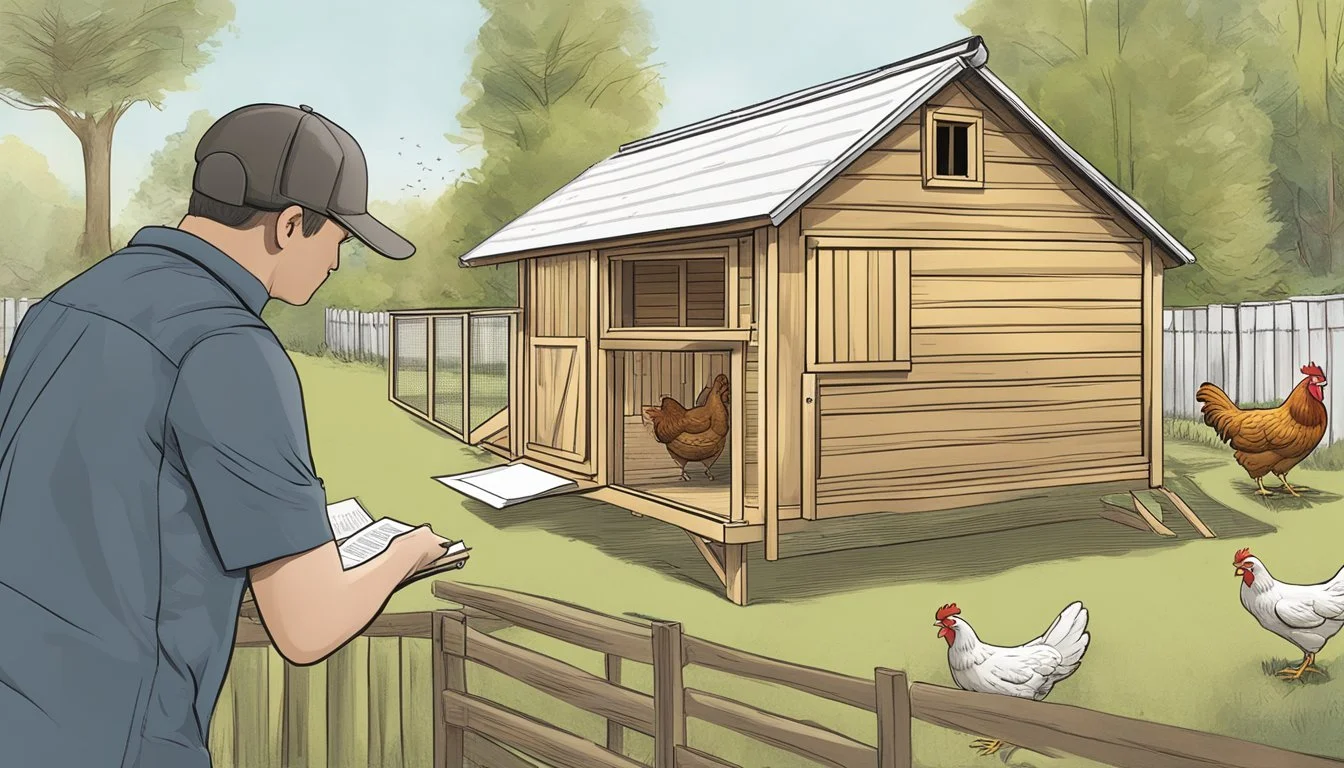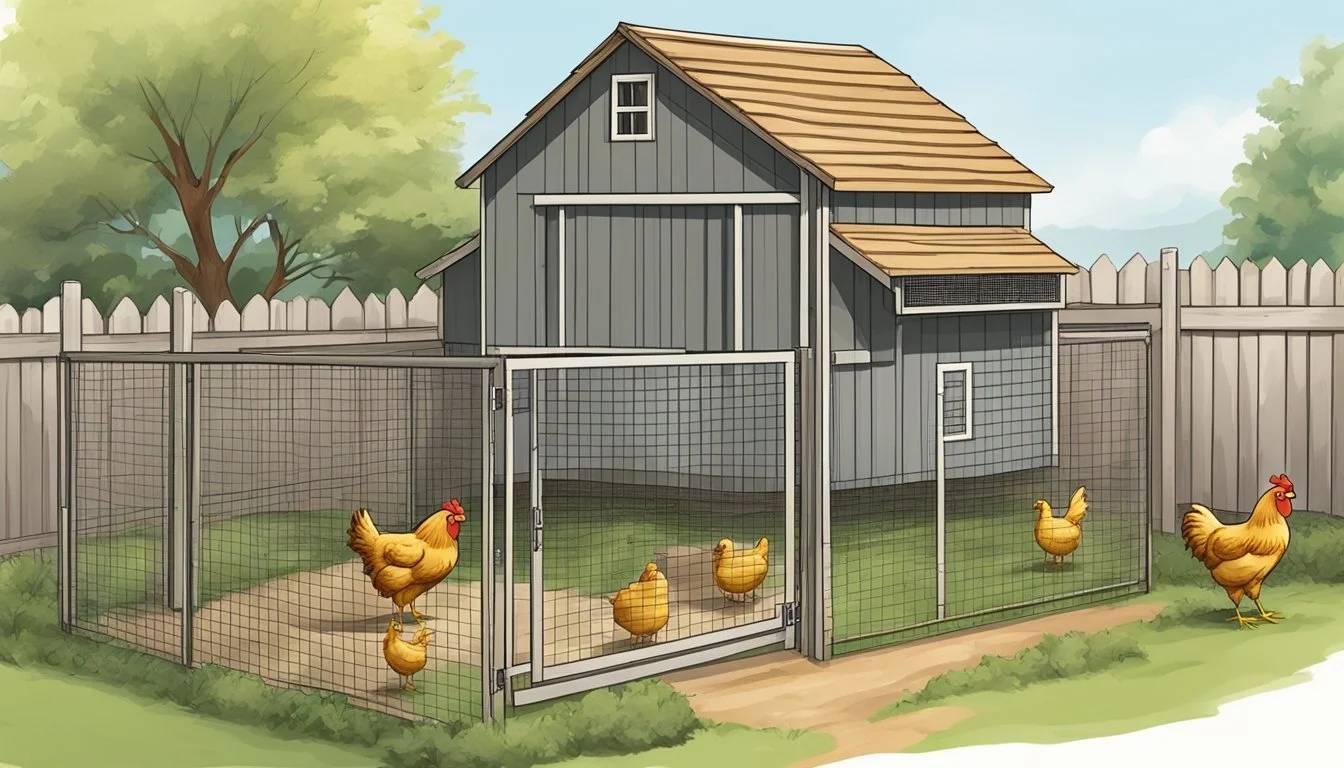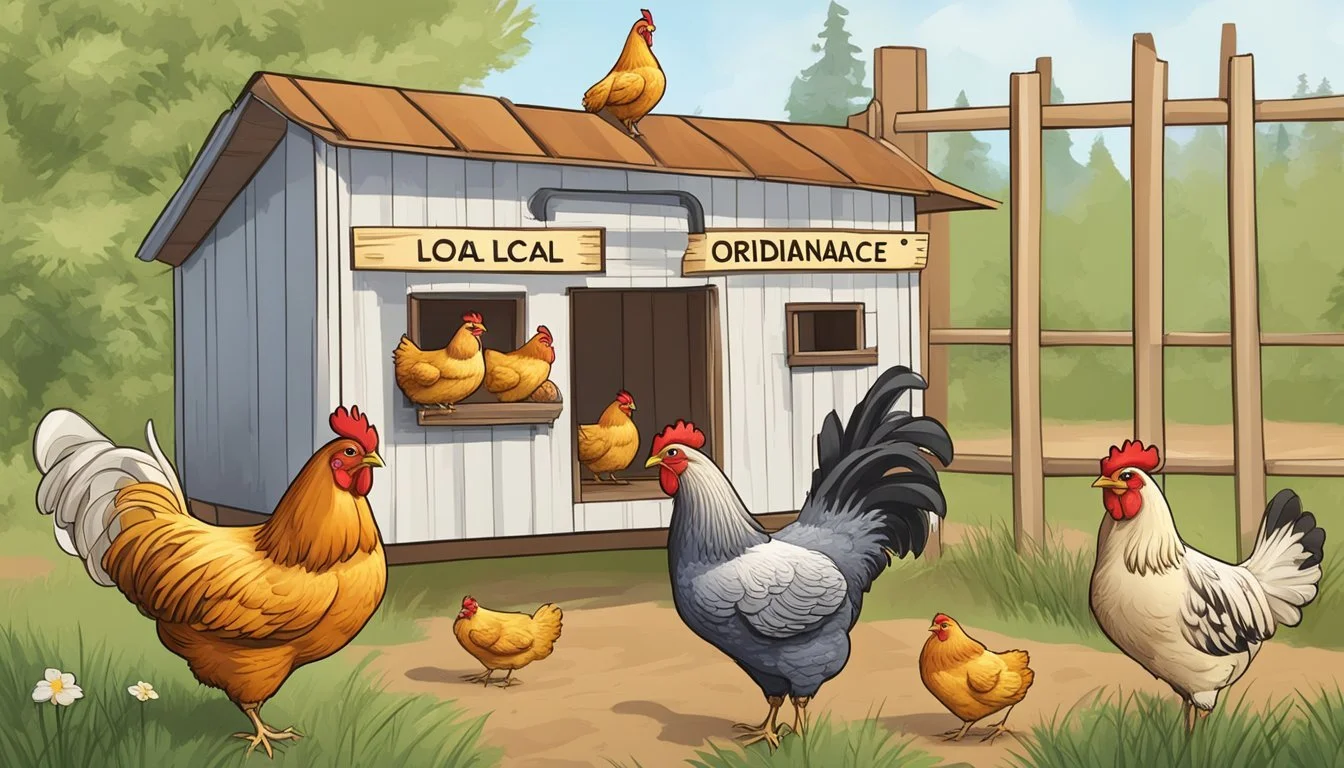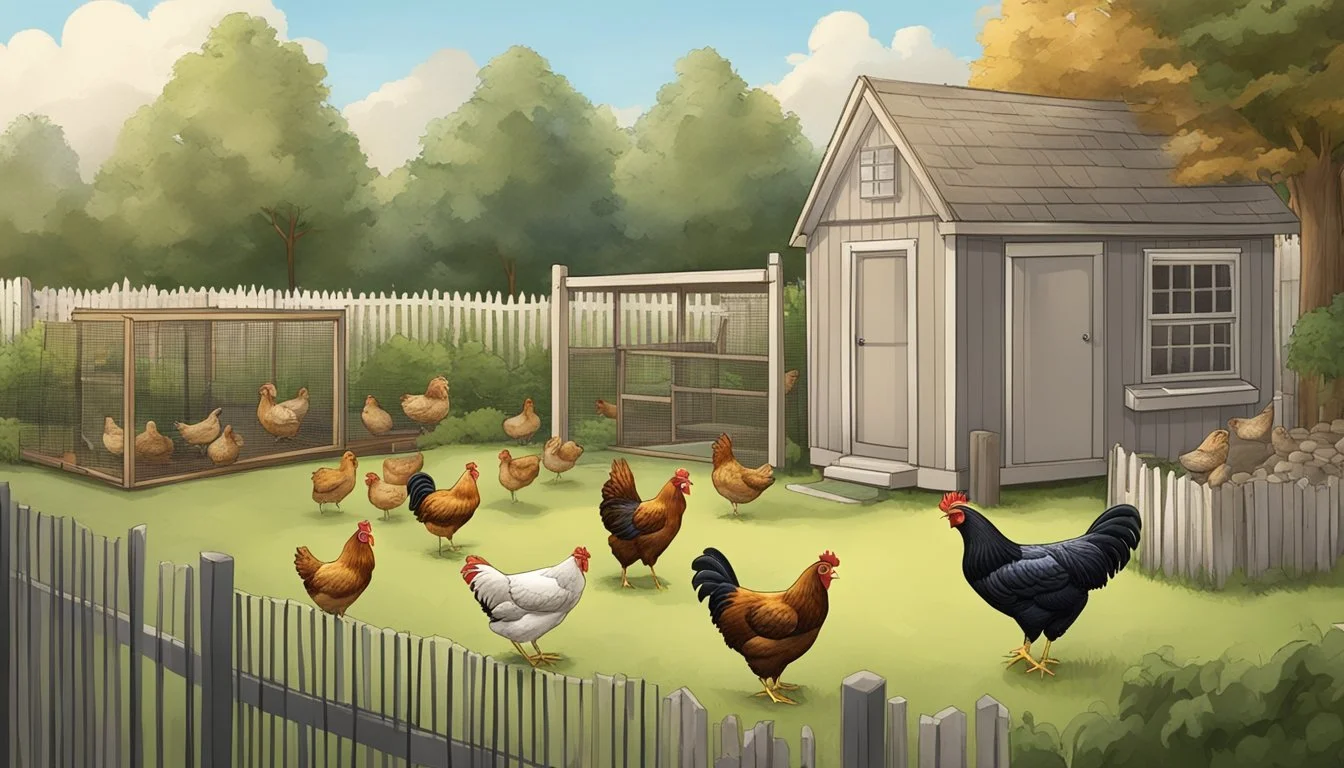How do I Ensure that My Chickens Are Legally Compliant
Navigating Local Ordinances
Keeping backyard chickens has gained popularity as part of a sustainable living movement, and it's crucial for owners to understand the laws and regulations that govern this practice. To ensure that one's flock is legally compliant, they must first ascertain local ordinances related to poultry. These laws can vary significantly between different municipalities, and they often outline restrictions on the number of chickens allowed, the requirement for permits, housing specifications, and nuisance control measures related to noise and odor.
Navigating these rules is essential to avoid penalties and to maintain good relationships with neighbors. For instance, in some cases, certain domestic fowl like turkeys, ducks, and geese might be prohibited, while chickens are allowed. Potential owners should thoroughly research their local laws for raising backyard chickens to understand the specific stipulations in their area.
Moreover, there may be considerations beyond just the local regulations, such as state or community association laws. Attention to zoning restrictions, the size of one's property, and the impact on nearby properties are also factors that can influence chicken ownership. Individuals looking to engage in this activity should not only research the legal framework but also prepare to navigate any potential legal issues that may arise from owning chickens. By being well-informed and proactive, chicken owners can enjoy the benefits of their backyard flocks without running afoul of the law.
Understanding Local Ordinances
Ensuring that your chicken-keeping practices comply with local ordinances is key to avoiding legal issues and fostering a community-respectful environment. It involves a thorough understanding of the different levels of laws, from city to state, and knowing the specific livestock and poultry regulations applicable to your area.
Navigating City, County, and State Laws
City, county, and state laws may differ in terms of allowances and restrictions for keeping chickens. City ordinances often address noise levels, the number of chickens allowed, and coop placement. County regulations can provide additional rules on the operation size and manure management. State laws may intervene with health and safety standards, especially regarding the sale of eggs or meat. It's essential for every chicken keeper to:
Check city ordinances through local government websites or at city hall.
Review county-specific livestock regulations which are frequently found in county clerk's offices or online portals.
Understand state laws pertaining to agricultural practices by consulting with state departments or agricultural extension offices.
Identifying Relevant Livestock and Poultry Regulations
Livestock and poultry regulations are tailored to ensure animal welfare and public safety. They can vary greatly, even within the same state or county, depending on the local context. Key regulations include:
Permits and Licenses: Requirements for keeping more than a certain number of chickens, often found in city or county ordinances.
Housing and Space Requirements: Specifications on coop construction and minimum space per bird.
Zoning Laws: Determining whether an area is zoned for agricultural purposes can define if you can keep chickens at all.
It is mandatory for individuals to know and adhere to the applicable laws, as ignorance can lead to fines, confiscation of chickens, or the need to rehome them, which can be emotionally and financially taxing.
Housing Your Chickens
Ensuring that chicken coops comply with local regulations is critical for the legality and harmony of any backyard flock. Proper coop design and maintaining cleanliness are both pivotal points that must be addressed in adherence to local ordinances.
Coop Design and Location Requirements
Local restrictions often dictate specifics such as the size and construction of a chicken coop, placing importance on requirements like minimum square footage per bird. This ensures the well-being of the chickens. The coop must allow ample space for chickens to stand and move around, commonly at least 2 square feet per hen. Roosters may be subject to additional regulations or bans due to noise concerns, potentially impacting neighbors. Coops should be positioned to minimize disturbance and consider property lines, setback distances, and any zoning laws that might apply to backyard flocks.
Coop design should also facilitate protected outdoor access for chickens, keeping them enclosed but able to enjoy the outdoors safely. Durable materials should be used to protect them from predators and severe weather conditions.
Maintaining Cleanliness and Preventing Odor
To prevent odor and ensure the area remains clean, regular maintenance of chicken coops is necessary. Chicken coops must be cleaned frequently to remove waste and prevent the buildup of ammonia, which can lead to health issues for both the chickens and the neighboring human population. Bedding such as straw or wood shavings should be changed regularly, and waste should be disposed of in accordance with local guidelines to maintain cleanliness and control odors. Proper ventilation is essential not only for the health of the chickens but also to diffuse odors that might cause issues with neighbors. It's important to maintain a routine to mitigate any potential complaints regarding cleanliness or smells emanating from the coop.
Legal Considerations for Keeping Chickens
Before introducing chickens to your backyard, it is crucial to understand the local laws that govern keeping a flock. This knowledge helps ensure your chicken-keeping practices are not only beneficial but also compliant with legal requirements.
Permits and Restrictions
Local governments may require residents to obtain permits for keeping chickens within city or town limits. These permits often come with specific restrictions regarding coop placement, design, and maintenance standards to minimize nuisance and maintain public health. Always check with local authorities to determine the necessary permit requirements; for instance, some cities may prohibit roosters or mandate consent from neighbors before approval.
Navigating Neighborhood and Residential Area Guidelines
When keeping chickens in a residential area, adherence to neighborhood and homeowner association guidelines is as essential as following local ordinances. These guidelines may outline permissible number of chickens, acceptable noise levels, and flock containment rules. Regularly engaging with neighbors and staying informed about any residential guidelines helps maintain a harmonious community and reduces conflicts.
Understanding Flock Limitations
Most municipalities have clear limitations on the size of chicken flocks allowed in residential areas. These limits often vary depending on the size of your property, with specific caps on the number of hens permitted. Local zoning laws may also dictate the minimum distance between chicken coops and property lines, as well as neighbors' dwellings, to manage smell and noise. Checking with the local government will provide the most accurate information on flock limitations for your area.
Health and Safety Regulations
Ensuring that chickens are housed in a manner compliant with local health and safety regulations is pivotal for maintaining a healthy flock and protecting public health. Regulations typically address disease prevention and coop security to promote the well-being of the poultry and safeguard the community.
Preventing and Controlling Disease
To prevent the spread of diseases like salmonella and avian influenza, proper hygiene and routine health checks are essential. Owners should establish a regular cleaning schedule for coops and equipment, emphasizing the removal of soiled bedding and the disinfection of surfaces. It is also vital to provide adequate space for each chicken to reduce stress and aggression, which can lead to compromised immune systems.
Local ordinances may require the vaccination of chickens against certain diseases. Consulting health and safety regulations can reveal specific mandates for vaccinations and quarantine procedures for new or ill birds. Furthermore, measures should be in place for safe handling and storage of chicken feed to prevent contamination and vermin attraction.
Protecting Chickens from Predators
Effective protection against predators is a non-negotiable aspect of responsible chicken keeping. Coops must be fortified with sturdy materials to prevent entry from predators such as foxes, raccoons, and birds of prey. This includes secure latches on doors and the use of hardware cloth instead of chicken wire, which can be easily breached.
Additionally, enclosing outdoor runs with fencing that extends underground can deter digging predators. Natural deterrents or predator-proof shelters can also be used to minimize the risk of attacks. Monitoring for signs of attempted predation is vital to assess the adequacy of the current protection measures and to make necessary enhancements promptly.
Community Relations and Legal Compliance
Adhering to local ordinances is crucial for ensuring that one's backyard chickens do not become a public nuisance. This involves being proactive in areas such as noise control and maintaining positive relations with neighbors.
Minimizing Noise and Nuisance
Urban, suburban, and rural chicken owners have the responsibility to prevent their flocks from becoming noisy pests. Noise regulations vary by location, but there are general practices to follow:
Roosters: Often banned in urban settings; if allowed, ensure they are not causing excessive noise.
Hens: Less noisy, but measures should be taken to minimize squawking during egg-laying.
Coop placement: Keep coops away from property lines to reduce noise transmission to neighbors.
In addition to noise, it is important to manage potential pests and maintain clean, odor-free, and dry coops to prevent attracting rodents, which can also be a source of contention.
Engaging in Open Communication with Neighbors
Open communication with neighbors is paramount, irrespective of whether you reside in an urban, suburban, or rural setting.
Inform neighbors of your intent to keep chickens and address any concerns they may have.
Share knowledge about how you will provide water and agricultural management to prevent public nuisance issues.
By taking a transparent approach, you foster trust and may even turn neighbors into allies who appreciate the benefits of local, fresh eggs.
Special Considerations
Successful chicken ownership requires awareness of specific regulations and a collaborative approach with local authorities and community associations. These nuances can dramatically influence how you manage your flock.
Specific City and State Chicken Laws
In New York City, chicken keepers are allowed to maintain hens, but no roosters, due to noise ordinances. Conversely, Texas does not have a statewide ban on breeds, but individuals must check for specific city ordinances. For example, some cities may have limitations on the number of chickens you can keep based on lot size. Michigan's regulations can vary greatly between cities; thus, it is crucial to consult with the local zoning office for precise rules. In Knoxville, Tennessee, certain regulations may prohibit the sale of eggs from backyard chickens, which can impact those looking to engage in selling homegrown produce.
Working with Homeowner Associations and Township Regulations
Homeowner Association (HOA) rules can sometimes be more restrictive than city ordinances. For instance, an HOA in Texas might implement rules that go beyond the city’s laws, potentially restricting the types, breeds, or number of chickens. It is important for residents to actively participate in HOA meetings or discussions to understand and navigate these restrictions. Engaging with the township or city hall may also be necessary, especially in nearby towns where local laws may differ significantly. Residents in Michigan should take into account township ordinances which could be different from city laws when it comes to chicken keeping.
The Business of Chicken Keeping
Engaging in the sale of eggs and other products from backyard chicken keeping can offer local fresh produce to the community. It also involves adhering to specific rules and regulations that vary by location to ensure fair practice and public health safety.
Rules on Sale of Eggs and Other Products
The sale of eggs requires a keen understanding of local regulations, as they dictate requirements for licensing, labeling, and health standards. For instance, some areas may necessitate candling and grading of eggs, while others could require inspections to ensure the eggs meet safety criteria. Producers should be informed about how many chickens they can legally have and the amount of eggs they are allowed to sell without facing regulatory challenges.
When considering products beyond eggs, like chicken meat or feathers, zoning laws and health department regulations come into play. They are required to ensure that all items are processed in a manner that doesn't compromise public health. Products should be clearly labeled with details such as the date of collection and processing information, enabling transparency and trust with consumers.
Assimilating Backyard Chicken Keeping into Local Businesses
Backyard chicken keeping can be incorporated into local businesses to support a sustainable and self-sufficient community. Establishments may partner with local chicken keepers to source fresh eggs and poultry, thus endorsing small-scale farming. Such integration may require businesses to understand the intricacies of raising chickens properly and ensuring that they comply with nuisance laws, which helps prevent issues like excessive noise or odors.
Maintaining proper sanitation within backyard coops is essential not just for the health of the chickens but also for product quality. Businesses must stay informed about and comply with local sanitation requirements to avoid any health and safety violations. This not only supports regulatory compliance but also builds consumers' trust in local products.
Conclusion
Ensuring legal compliance with local ordinances for backyard chickens requires diligence and understanding of the relevant laws. Homeowners should first consult their state laws and regulations concerning the keeping of chickens. It's imperative to check for any restrictions on the number of chickens allowed, space requirements, and coop specifications.
Key Steps for Compliance:
Research: Verify local ordinances through municipal websites or by contacting local authorities directly.
Coop Design: Ensure that the coop meets the size and structural guidelines.
Neighborly Relations: Address any concerns your neighbors might have proactively to avoid issues.
Homeowners may find themselves in situations where neighbor's chickens encroach on their property. In such cases, it is recommended to explore mediation by contacting local authorities or mediation services for assistance.
To be proactive, they should monitor for changes in laws and participate in local forums to stay informed. If ordinances are found to be restrictive, they can form community groups to advocate for more chicken-friendly laws.
By adhering to these measures, homeowners can confidently maintain their backyard flocks within the bounds of the law.










